Rev Alternatives
Considering a switch from Rev? This guide compares 10 other transcription services on pricing, accuracy, and turnaround time to inform your decision.
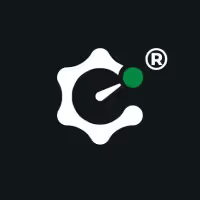
Rev is a tool many go-to-market teams use for good reasons. It performs well for core RevOps functions, offering clear data for sales forecasting and pipeline visibility. Teams often pick it for these specific strengths and find it works for their needs.
Still, some users find its reporting can be rigid or that certain integrations are missing. This might lead teams to seek other options. We have identified the best alternatives to Rev and analyzed them to help you choose. Let's get started.
11x: Digital Workers for Your Sales Team
For teams interested in digital workers for sales, 11x is a relevant option. The platform offers autonomous agents to perform sales development tasks. This may be a fit if you want to add automated capabilities to your sales function and keep your current team.
11x is a GTM platform that uses AI agents to manage the sales process. Its agent, Alice, finds prospects, handles outreach, and updates the CRM. Another agent, Julian, qualifies inbound leads and books meetings.
The platform replaces separate tools for data enrichment, outreach, and email warmup by combining these functions.
Rev Alternatives
Below is a detailed breakdown of each alternative. We analyze their pricing, features, and how they stack up against Rev in terms of strengths and potential drawbacks.
1) ZoomInfo SalesOS
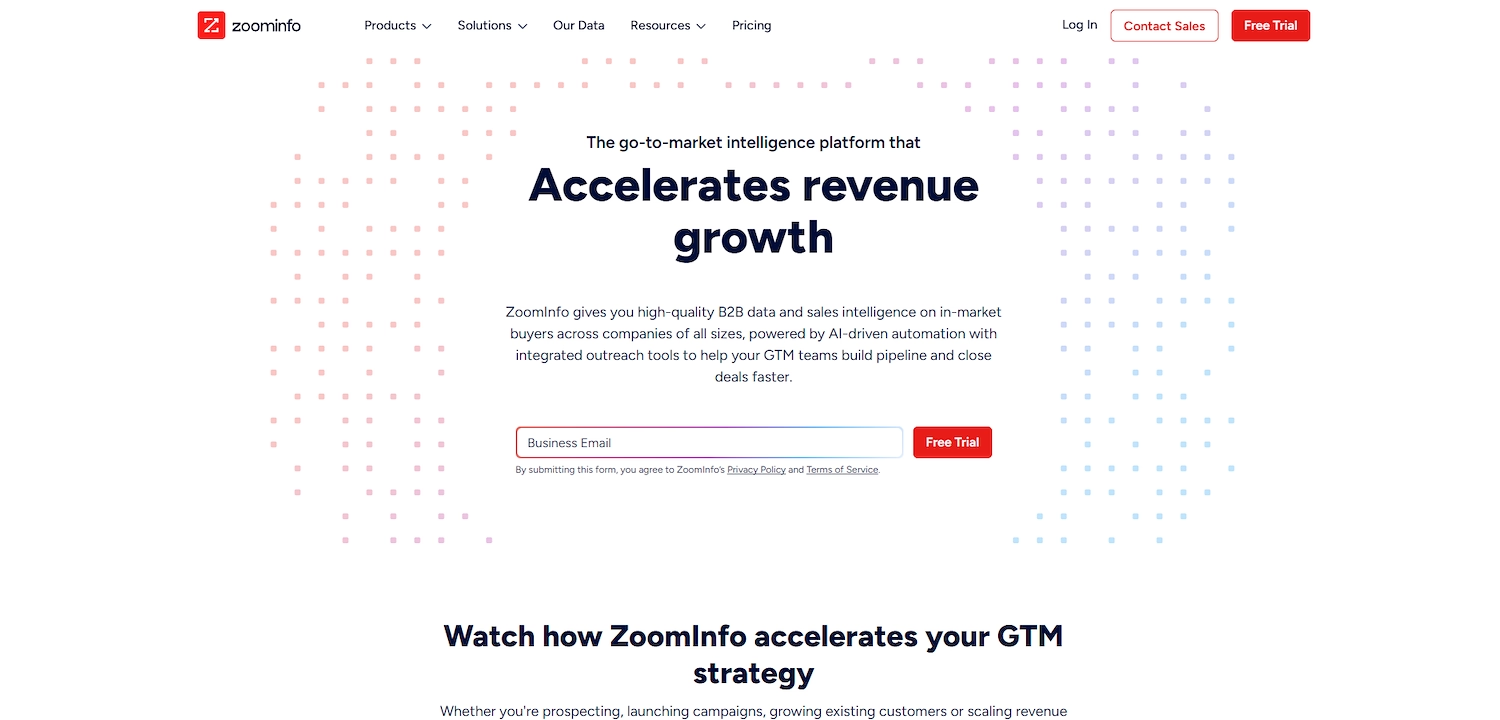
ZoomInfo SalesOS is a go-to-market intelligence platform for B2B companies. It uses AI to help sales, marketing, and RevOps teams identify and connect with buyers. The platform unifies contact data, intent signals, and engagement tools into a single operating system.
Its main use cases are prospect discovery, pipeline generation, and the automation of data workflows. The system acts as a single source of truth for GTM functions.
ZoomInfo SalesOS's Main Features
- Provides contact and company search, buyer intent signals, and website visitor tracking to identify prospects.
- Automates phone and email outreach and analyzes call interactions using conversation intelligence.
- Triggers GTM activities with automated workflows and enriches CRM data in real time.
- Includes a generative AI companion, Copilot, to surface insights and draft outreach.
How ZoomInfo SalesOS Compares to Rev
Average Review score: 4.5/5 stars based on 8,738 G2 reviews.
- ZoomInfo SalesOS offers a large database of contact and company information to find new prospects. This is a different function compared to Rev, which is built to manage existing pipeline data.
- It provides buyer intent data to identify prospects who actively research solutions. This differs from Rev's focus, which is to forecast based on data already in the CRM.
- The platform includes built-in tools for sales engagement, like automated email and phone outreach. This contrasts with Rev, which generally requires separate tools for outreach execution.
- An AI companion, Copilot, helps draft outreach messages and surface key insights. This offers a generative AI capability for sales tasks that is distinct from Rev's analytical features.
Potential Drawbacks Compared to Rev
- The platform centers on prospect discovery. It lacks the dedicated sales forecasting and deep pipeline analytics for existing deals that Rev provides. This can be a drawback for teams focused on revenue predictability.
- Its features support sales and marketing intelligence more than core revenue operations. Unlike Rev, it does not offer specific tools for functions like in-depth deal inspection or forecast submissions across a sales team.
- Some users find that contact or company data can be inaccurate or outdated. This is a different challenge compared to Rev, which operates on the internal data that already exists within a company's CRM.
Cost and Budget Considerations
ZoomInfo SalesOS does not provide public pricing, but it is perceived as a high-cost solution. Rev also requires a custom quote, making a direct cost comparison difficult without contacting both companies.
2) Apollo.io
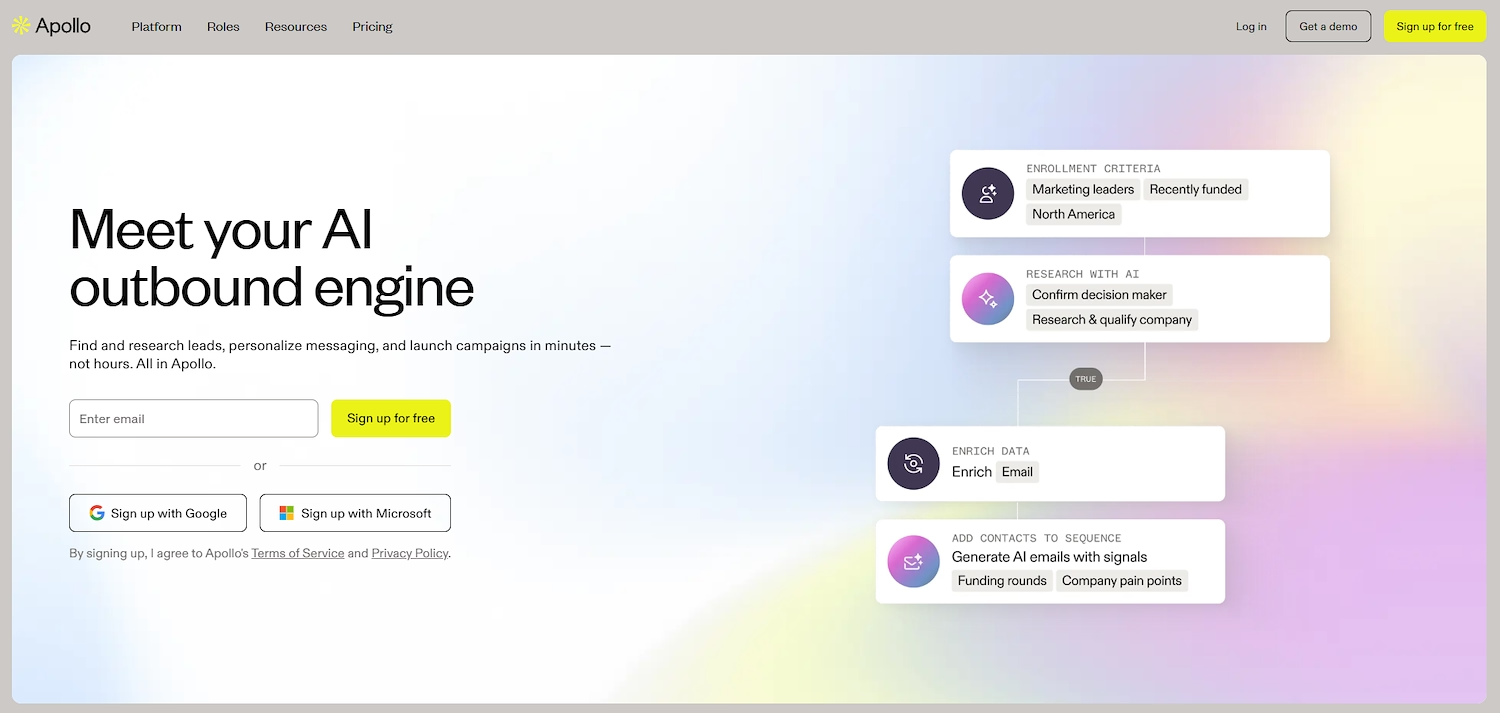
Apollo.io is a sales intelligence and engagement platform. It offers a B2B database with contact and company data, plus tools for sales execution. The system unifies data and outreach functions for go-to-market teams.
Primary use cases include prospect discovery, lead list creation, and outreach automation. It also handles data enrichment to keep CRM information current.
Apollo.io's Main Features
- Offers a B2B database with contact and company data for prospect discovery.
- Includes tools for sales execution, such as outreach automation and lead list creation.
- Handles data enrichment to keep CRM information current.
How Apollo.io Compares to Rev
Average Review score: 4.7/5 stars based on 8,904 G2 reviews.
- Apollo.io offers a B2B database of over 210 million contacts to find new leads. This differs from Rev, which analyzes data already present in a company's CRM.
- It unifies lead generation and outreach tools into a single platform. This contrasts with Rev's focus on pipeline analytics, which may need other tools for sales execution.
- The tool has public pricing, including a free plan for teams to start. This approach is different from Rev, which requires a custom quote.
- Its built-in engagement suite automates sales outreach. This provides an all-in-one function for execution, whereas Rev is designed more for analysis and forecasting.
Potential Drawbacks Compared to Rev
- Apollo.io lacks the deep sales forecasting capabilities found in Rev. For teams that need revenue predictions with high accuracy from pipeline data, this can be a significant difference, as Rev specializes in this area.
- The platform does not offer the same in-depth deal inspection tools as Rev. It focuses more on lead generation, so users might miss Rev's features to analyze the health and progression of individual deals.
- Its features are not built for core revenue operations workflows like forecast submissions. Unlike Rev, which structures processes for sales teams to submit and review forecasts, Apollo.io centers on top-of-funnel tasks.
Cost and Budget Considerations
Apollo.io has public pricing with a free plan and paid tiers starting at $49 per user. Rev requires a custom quote, which is typical for enterprise software. This makes Apollo.io more accessible for smaller teams; for full details, visit Apollo.io's official website.
3) Cognism
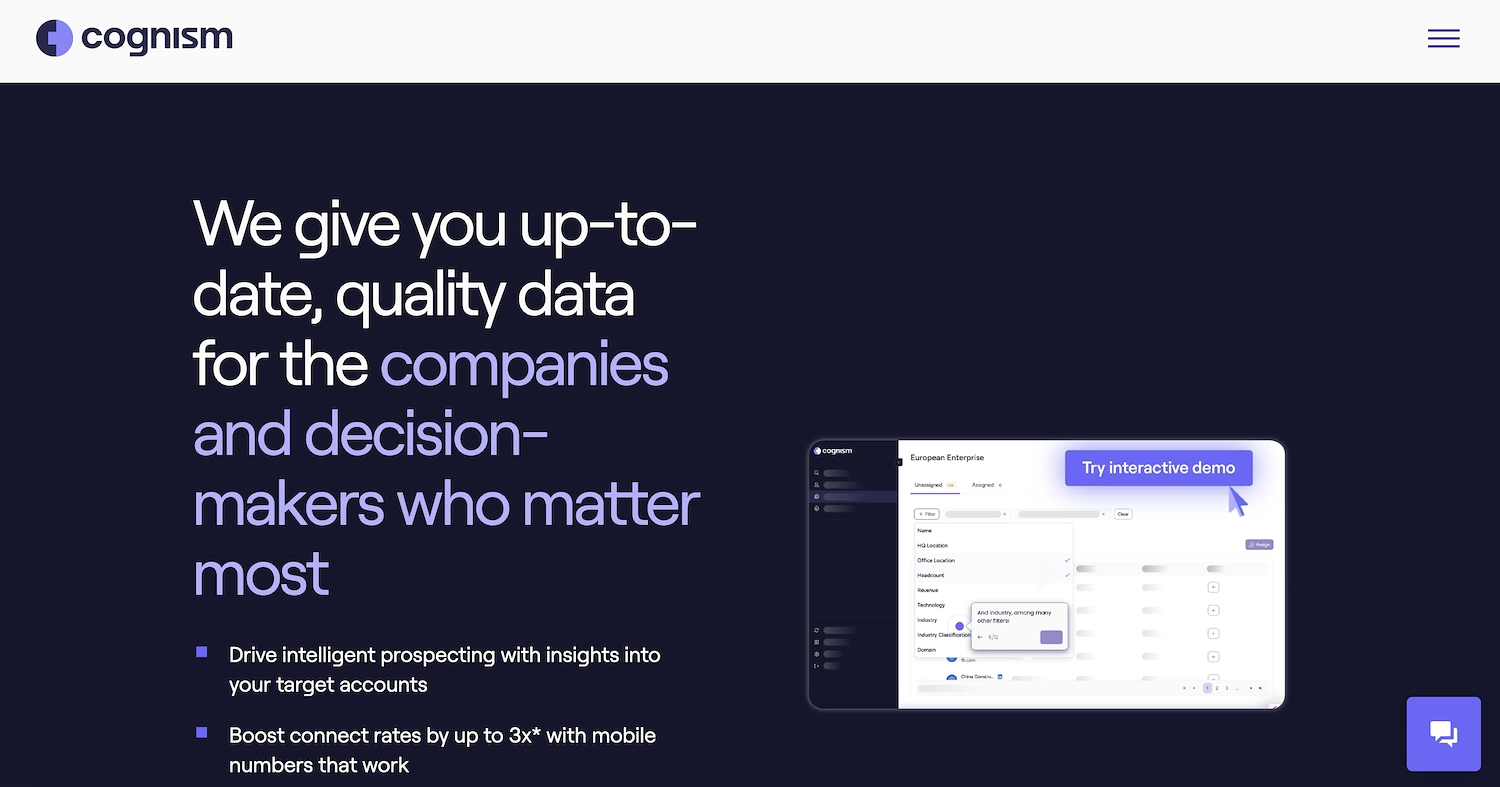
Cognism is a B2B data platform that provides GDPR-compliant contact and company information, with a focus on the UK and EMEA. Its main use cases are to build outreach lists and enrich CRM data.
The service offers phone-verified mobile numbers and details on senior decision-makers. This helps sales and RevOps teams with prospect discovery and pipeline development.
Cognism's Main Features
- Provides phone-verified mobile numbers, known as Diamond Data®, with strong coverage in the UK and EMEA.
- Surfaces buying signals from hiring trends, funding rounds, and technographic changes for timely outreach.
- Offers a database of senior-level decision-makers, screened against Do-Not-Call lists for compliant outreach.
- Includes a browser extension, Sales Companion, to prospect directly from LinkedIn and corporate websites.
How Cognism Compares to Rev
Average Review score: 4.6/5 stars based on 1,033 G2 reviews.
- Cognism provides GDPR-compliant contact data with a strong focus on the UK and EMEA. This is different from Rev, which analyzes internal CRM data and does not source external prospect information.
- It offers phone-verified mobile numbers, which helps sales teams connect directly with prospects. Rev does not include a contact database; it focuses on forecasting from existing deal information.
- The platform identifies buying signals like company funding rounds for timely outreach. This contrasts with Rev's function to analyze the progression of deals already in the pipeline.
- This tool enriches CRM records with current contact and company details. This data-sourcing function is different from Rev, which uses the data already present in the CRM for its analytics.
Potential Drawbacks Compared to Rev
- Cognism does not provide sales forecasting tools. For teams that need to predict revenue from an existing pipeline, this is a notable difference from Rev, which centers on this type of analysis.
- The platform lacks deep deal inspection capabilities. Unlike Rev, it does not offer features to analyze the health or progression of individual deals that are already in the sales cycle.
- It is not designed for internal revenue operations workflows. This means it misses functions for forecast submissions or team-wide pipeline reviews, which are central to how Rev operates.
Cost and Budget Considerations
Both Cognism and Rev require a custom quote, so a direct price comparison is not possible. User reviews indicate Cognism is a high-cost solution, which may be a consideration for smaller teams. For specific pricing details, we recommend visiting Cognism's official website.
4) Seamless.ai
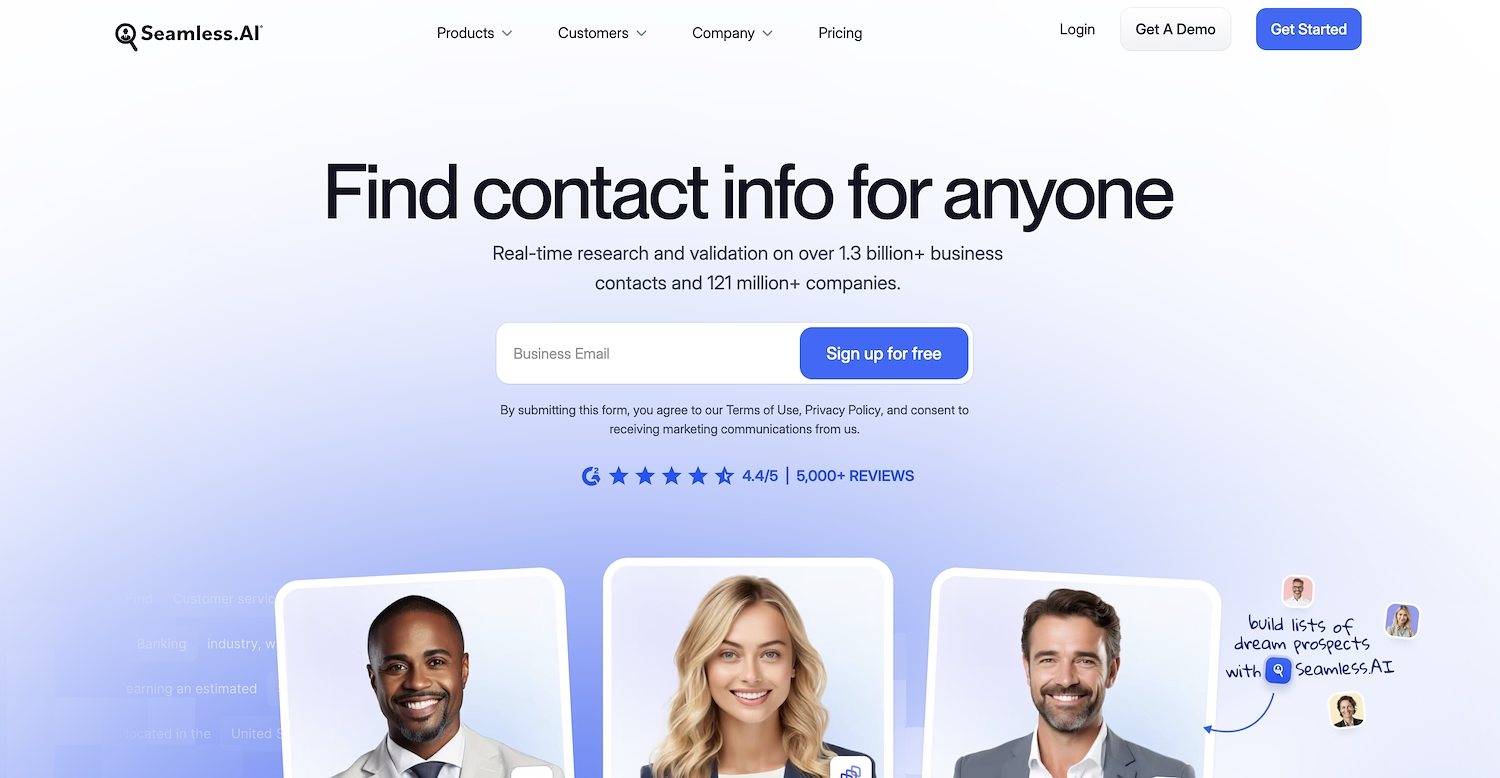
Seamless.ai is a sales intelligence platform that uses AI to help go-to-market teams build prospect lists and find contact information. The system supports the automation of different parts of the sales process. Its main use cases are lead generation and data enrichment for sales and marketing outreach.
Seamless.ai's Main Features
- Searches a database of over 1.3 billion contacts and 121 million companies to find prospect profiles with email and phone data.
- Identifies buyer intent data to surface prospects who are actively looking to make a purchase.
- Detects when contacts change jobs and automatically provides alerts with their new information.
- Uses an AI-powered autopilot feature to automate list-building and keep the sales pipeline supplied with new leads.
How Seamless.ai Compares to Rev
Average Review score: 4.4/5 stars based on 5,067 G2 reviews.
- Seamless.ai provides a real-time search engine to find new prospect data from its database. This is different from Rev, which focuses on analyzing contacts already within a company's CRM.
- The platform detects buyer intent signals to help teams find active buyers. This offers a different approach compared to Rev, which forecasts revenue based on existing pipeline activity.
- It includes an AI autopilot feature to automate the creation of lead lists. This function supports top-of-funnel activities, while Rev is built for mid-to-bottom-funnel deal analysis.
- This tool automatically alerts users when a contact changes jobs, helping maintain data accuracy for outreach. This specific data intelligence feature is not present in Rev's analytics platform.
Potential Drawbacks Compared to Rev
- Seamless.ai does not provide sales forecasting features. This is a key difference from Rev, which specializes in analyzing pipeline data to predict future revenue for sales leaders.
- The platform lacks tools for in-depth deal inspection. Unlike Rev, it does not let users analyze the health or progression of specific deals already in the sales pipeline.
- It is not built for core revenue operations workflows. This means it misses functions for forecast submissions or team-wide pipeline reviews, which are central to how Rev operates.
Cost and Budget Considerations
Seamless.ai requires a custom quote, similar to Rev, and does not offer public pricing. User reviews indicate it is a high-cost solution. For the most accurate pricing, we recommend visiting Seamless.ai's official website.
5) Lusha
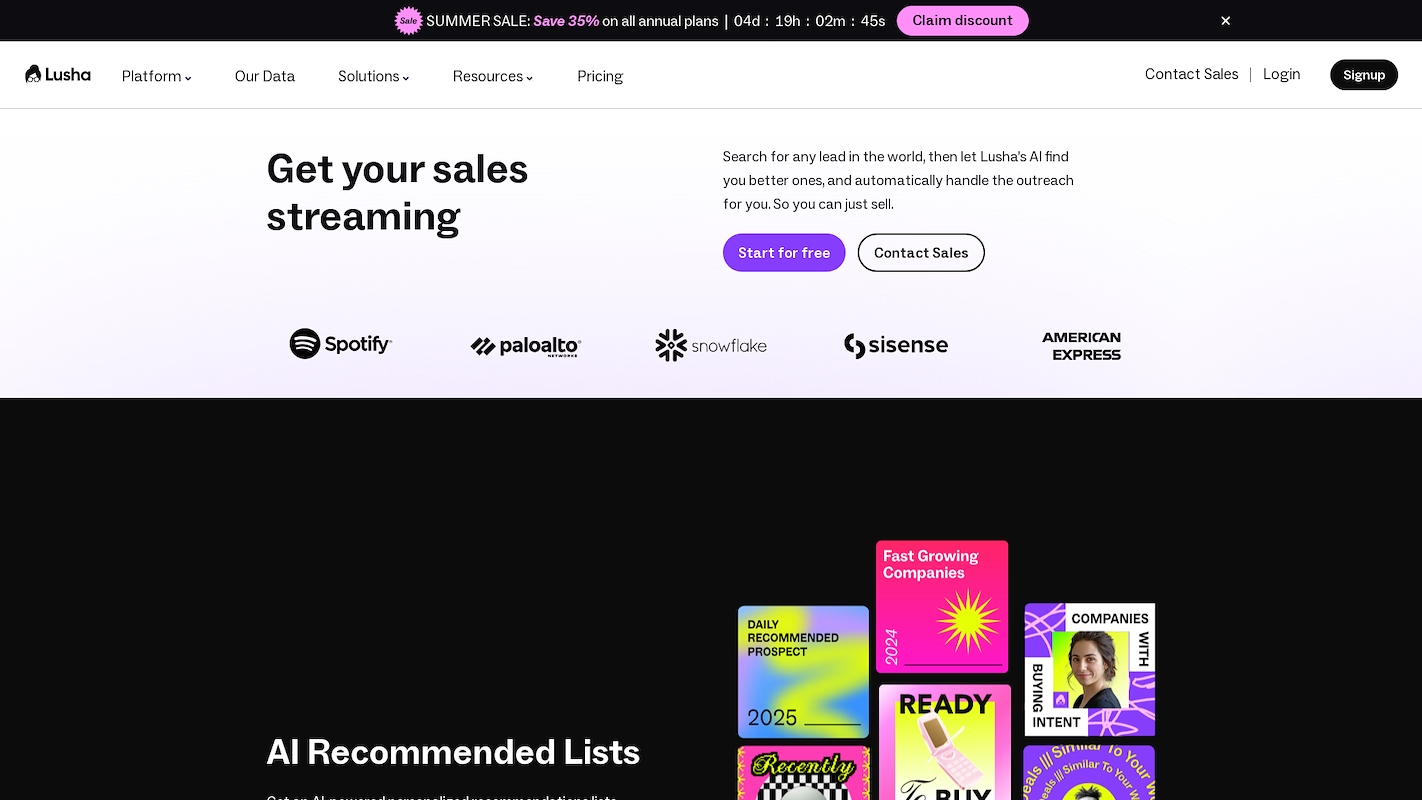
Lusha is a sales intelligence platform that provides B2B contact and company data. Go-to-market teams use it for prospect discovery and to enrich current data records. The system offers direct contact details, like emails and phone numbers, to help users build lists for sales outreach.
Lusha's Main Features
- Provides an AI-powered search for contacts and companies with filters for buyer intent and funding rounds.
- Creates live, auto-updating lead lists that add new prospects at user-defined intervals.
- Automates and personalizes email sequences using AI-generated copy to engage prospects.
- Offers a database certified for GDPR, CCPA, and ISO 27701 & 27001 compliance.
How Lusha Compares To Rev
Average Review score: 4.3/5 stars based on 1,516 G2 reviews.
- Lusha provides a database of B2B contact and company information for prospect discovery. This contrasts with Rev, which analyzes internal CRM data to forecast sales.
- It uses AI to create and automatically update lead lists. This provides a different function compared to Rev, which focuses on analyzing the health of deals already in the pipeline.
- The platform offers public pricing, including a free plan. This approach is different from Rev's enterprise model, which requires a custom quote.
- Its database is certified for GDPR and CCPA compliance, a feature specific to external data sourcing. This differs from Rev, which operates on a company's internal data.
Potential Drawbacks Compared To Rev
- Lusha does not include revenue forecast tools. This is a notable difference from Rev, which helps sales leaders predict future revenue based on deals already in their pipeline.
- The platform lacks tools for a deep dive into individual deals. In contrast, Rev allows managers to examine deal health and progression, a key part of pipeline management.
- It is not built for internal RevOps processes. For example, it misses a formal system for forecast submissions or team pipeline reviews, which are standard workflows in Rev.
Cost and Budget Considerations
Lusha offers public pricing with a free plan and paid tiers starting at $36 per user per month. In contrast, Rev requires a custom quote, which is typical for enterprise software. This makes Lusha more accessible for smaller teams, while Rev's model is better suited for larger, customized deployments. For full details, visit Lusha's official website.
Consider 11x for Digital Sales Workers
If your goal is to add automated capabilities to your sales function, 11x offers a different approach. Its autonomous agents handle tasks like prospect discovery and initial contact. This can supplement your team's efforts without a full system replacement. Explore 11x to see if it fits.
At 11x, we use AI to manage the sales process. Our agent Alice identifies accounts and handles outreach, while Julian qualifies leads and books meetings. The platform combines functions like data enrichment and email warmup, replacing the need for separate tools.
Book a demo to see the platform in action.
6) Clearbit
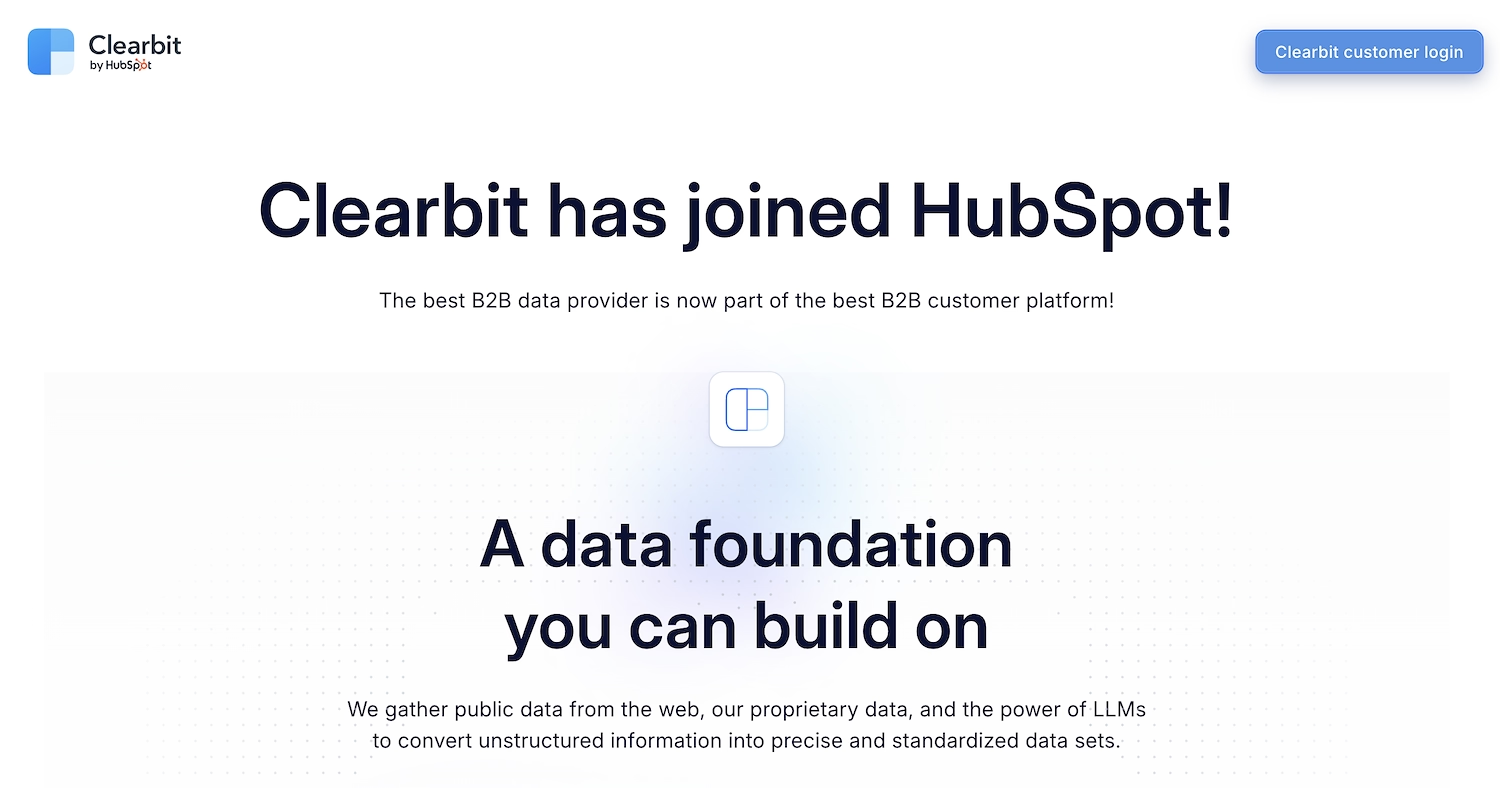
Clearbit is a marketing data platform for B2B companies. It provides data to enrich customer records and identify anonymous website traffic. Go-to-market teams use the service to define their ideal customer profile and total addressable market.
The data also informs lead scores and helps personalize marketing outreach. This allows teams to construct a full picture of their customers and prospects.
Clearbit's Main Features
- Enriches lead, contact, and account records with firmographic and demographic details from aggregated data sources.
- Identifies anonymous website traffic to reveal which visiting companies match an ideal customer profile.
- Provides data for real-time lead scoring and routing using deep industry classifications and corporate hierarchy mapping.
- Shortens web forms by automatically enriching fields, which can reduce friction and increase conversion rates.
How Clearbit Compares to Rev
Average Review score: 4.4/5 stars based on 626 G2 reviews.
- Clearbit enriches CRM records with external data points. This is different from Rev, which analyzes the data that already exists within a company's CRM.
- It identifies anonymous companies visiting a website to find new prospects. This contrasts with Rev, which focuses on forecasting and managing deals already in the pipeline.
- The platform provides data to help with real-time lead scoring and routing. This function supports top-of-funnel management, unlike Rev, which analyzes mid-to-bottom-funnel deal health.
- This tool can shorten web forms by automatically filling in visitor data. This feature helps increase lead conversion rates, a function not available in Rev's analytics platform.
Potential Drawbacks Compared to Rev
- Clearbit does not provide sales forecasting tools. This is a notable difference for teams that use Rev to predict revenue from their current sales pipeline.
- The platform lacks tools for deep deal inspection. Unlike Rev, it does not let managers analyze the health or progression of individual deals already in the sales cycle.
- It is not designed for internal revenue operations workflows. This means it misses functions for forecast submissions or team-wide pipeline reviews, which are central to how Rev operates.
Cost and Budget Considerations
Clearbit and Rev both require a custom quote, so a direct price comparison is not possible. For the most accurate pricing information, we recommend visiting Clearbit's official website.
7) LeadIQ
LeadIQ is a sales prospecting platform used to find and verify contact information. Sales teams use it to build prospect lists with accurate data. The system helps capture contact details from social profiles and websites and sync them to a CRM.
LeadIQ's Main Features
- Provides a browser extension to capture contact data from LinkedIn and other websites.
- Verifies emails and phone numbers in real time to improve data accuracy for outreach.
- Integrates with CRMs like Salesforce to push new contact information directly into sales workflows.
- Allows teams to track prospecting activity and manage credits from a central dashboard.
How LeadIQ Compares to Rev
Average Review score: 4.3/5 stars based on 681 G2 reviews.
- LeadIQ is built to find and capture new prospect contact data. This is different from Rev, which analyzes the deal data already inside a company’s CRM.
- It focuses on data acquisition for top-of-funnel activities. In contrast, Rev provides analytics and forecasting for mid-to-bottom-funnel management.
- The platform offers public pricing plans, including a free tier. This makes it more accessible than Rev, which operates on a custom quote basis for enterprise clients.
- Its main function is to supply sales teams with contact information. Rev’s function is to provide insights on pipeline health and revenue predictability from existing data.
Potential Drawbacks Compared to Rev
- LeadIQ does not offer sales forecasting tools. This is a primary function of Rev, which helps leaders predict revenue from their existing sales pipeline.
- The platform lacks features for in-depth deal inspection. Unlike Rev, it does not provide analytics to assess the health or progress of individual opportunities.
- It is not designed for core revenue operations workflows. The system does not include modules for forecast submissions or team pipeline reviews, which are standard in Rev.
Cost and Budget Considerations
LeadIQ offers public pricing with a free plan and paid tiers starting at $39 per user per month. Rev requires a custom quote. This makes LeadIQ a more accessible option for teams that need a predictable, per-seat cost structure. For full details, visit LeadIQ's official website.
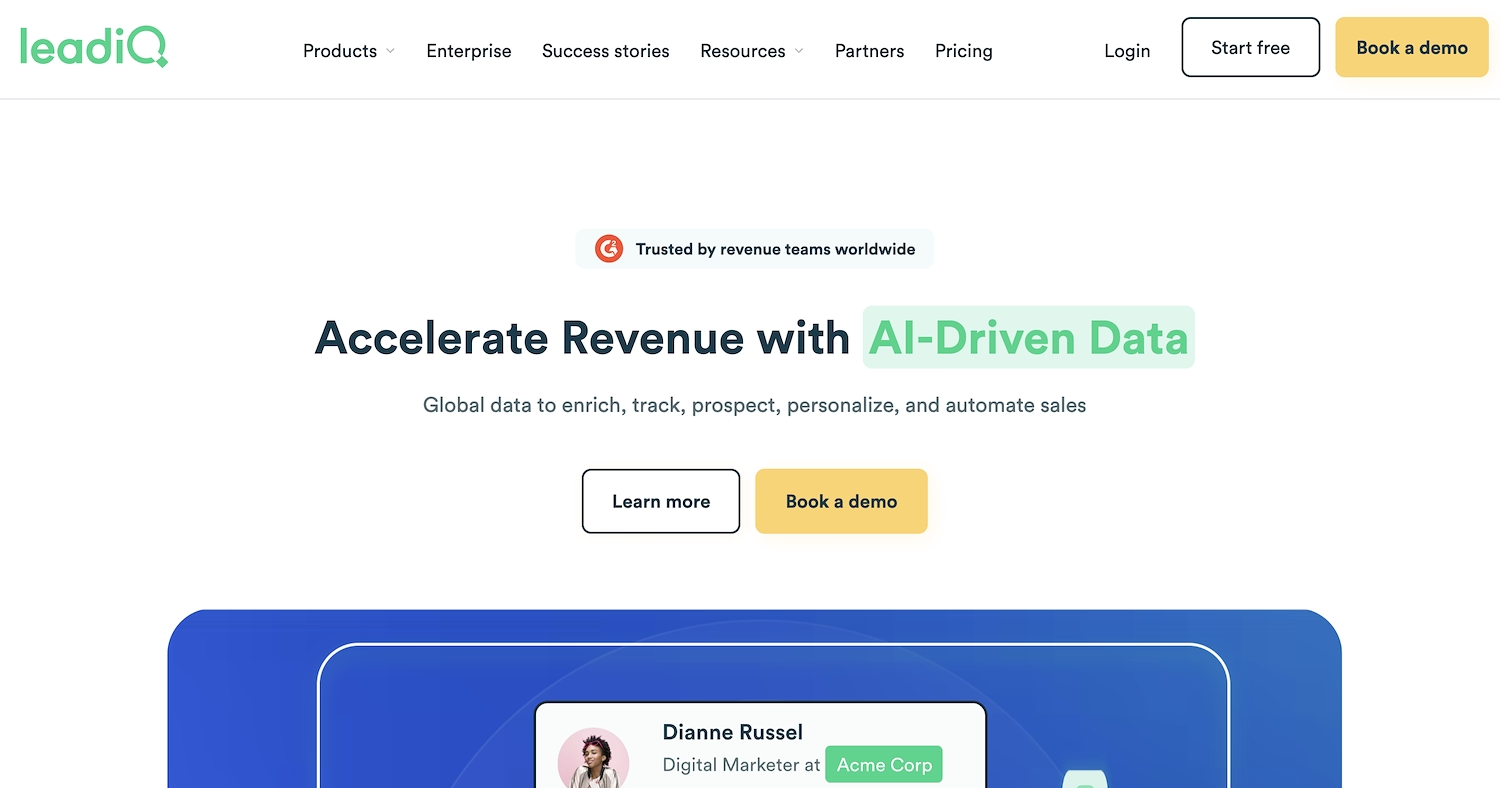
LeadIQ is a sales platform used to find and verify contact information. Sales teams use it to build prospect lists with accurate data. The system captures contact details from social profiles and websites and syncs them to a CRM.
LeadIQ's Main Features
- Captures contact data from LinkedIn and Sales Navigator with one click and syncs it to CRMs and sales engagement tools.
- Uses an AI feature, Scribe, to generate personalized outreach messages in seconds.
- Tracks job changes for previous customers and surfaces buying signals like company funding rounds or G2 intent data.
- Performs bulk CRM enrichment with customizable field mapping to keep data fresh.
How LeadIQ Compares to Rev
Average Review score: 4.2/5 stars based on 1,097 G2 reviews.
- LeadIQ finds new prospect contact information from external sources like LinkedIn. This differs from Rev, which analyzes internal data already present in your CRM.
- The tool supports top-of-funnel sales activities and helps teams build new prospect lists. Rev, in comparison, provides analytics for deals already in the sales pipeline.
- Its pricing is public and includes a free plan, which makes it accessible for teams to start without a large commitment. Rev requires a custom quote, a model typical for enterprise-level deployments.
- The platform's main function is to supply sales teams with verified contact information for outreach. This contrasts with Rev, which provides insights on pipeline health and revenue predictability from existing data.
Potential Drawbacks Compared To Rev
- LeadIQ does not analyze pipeline data to predict future sales outcomes. This function is a core part of Rev, which uses deal information to create detailed revenue forecasts for leadership.
- It does not provide tools to assess the health or risk of individual deals in the pipeline. In contrast, Rev gives managers specific features to inspect deal progression and identify potential blockers.
- The platform is not built for structured revenue operations processes like forecast submissions. This differs from Rev, which provides a formal system for sales teams to submit and review forecasts.
Cost and Budget Considerations
LeadIQ offers public pricing with a free plan and paid tiers starting at $45 per user per month. Rev requires a custom quote, making LeadIQ a more accessible option for teams that need a predictable cost structure. For full details, visit LeadIQ's official website.
8) SalesIntel
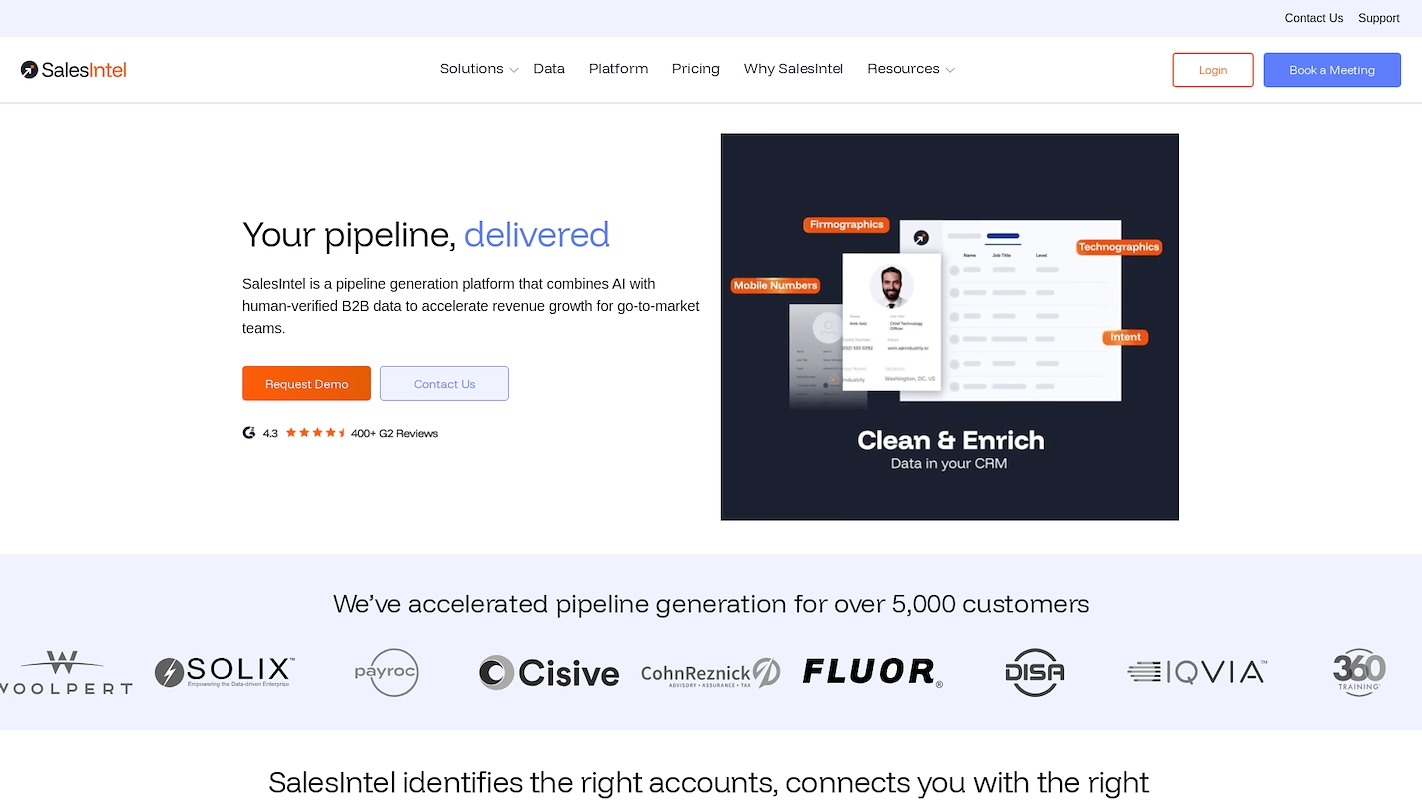
SalesIntel is a sales intelligence platform. It provides B2B data for go-to-market teams to use for prospect discovery and data enrichment.
The service offers contact and company information to build outreach lists and maintain accurate CRM data for sales and marketing functions.
SalesIntel's Main Features
- Builds prospect lists using contact, company, and industry research data.
- Cleans, enriches, and validates lead information to maintain data quality.
- Integrates with CRM and marketing automation systems to sync data into workflows.
How SalesIntel Compares to Rev
Average Review score: 4.3/5 stars based on 462 G2 reviews.
- SalesIntel provides human-verified B2B data to find new prospects. This is different from Rev, which analyzes the internal data that already exists in your CRM.
- It uses a 90-day data refresh cycle to help ensure contact information is current. Rev works with existing CRM data and does not have a data refresh function for external contacts.
- The platform identifies real-time intent signals to find buyers who are actively looking for solutions. This offers a different approach than Rev, which forecasts from deals already in the pipeline.
- This tool offers data enrichment to keep CRM records accurate. This data-sourcing function is distinct from Rev, which uses the data already present in the CRM for its analysis.
Potential Drawbacks Compared to Rev
- SalesIntel does not provide sales forecasting tools. This is a key difference from Rev, which is built to analyze pipeline data and help leaders predict future revenue.
- It lacks features for in-depth deal inspection. Unlike Rev, the platform does not offer analytics to assess the health or progress of individual opportunities already in the sales cycle.
- The platform is not designed for core revenue operations workflows. It does not include modules for forecast submissions or team pipeline reviews, which are standard features in Rev.
Cost and Budget Considerations
Both SalesIntel and Rev require a custom quote, so a direct price comparison is not possible. For the most accurate pricing information, we recommend visiting SalesIntel's official website.
9) Adapt
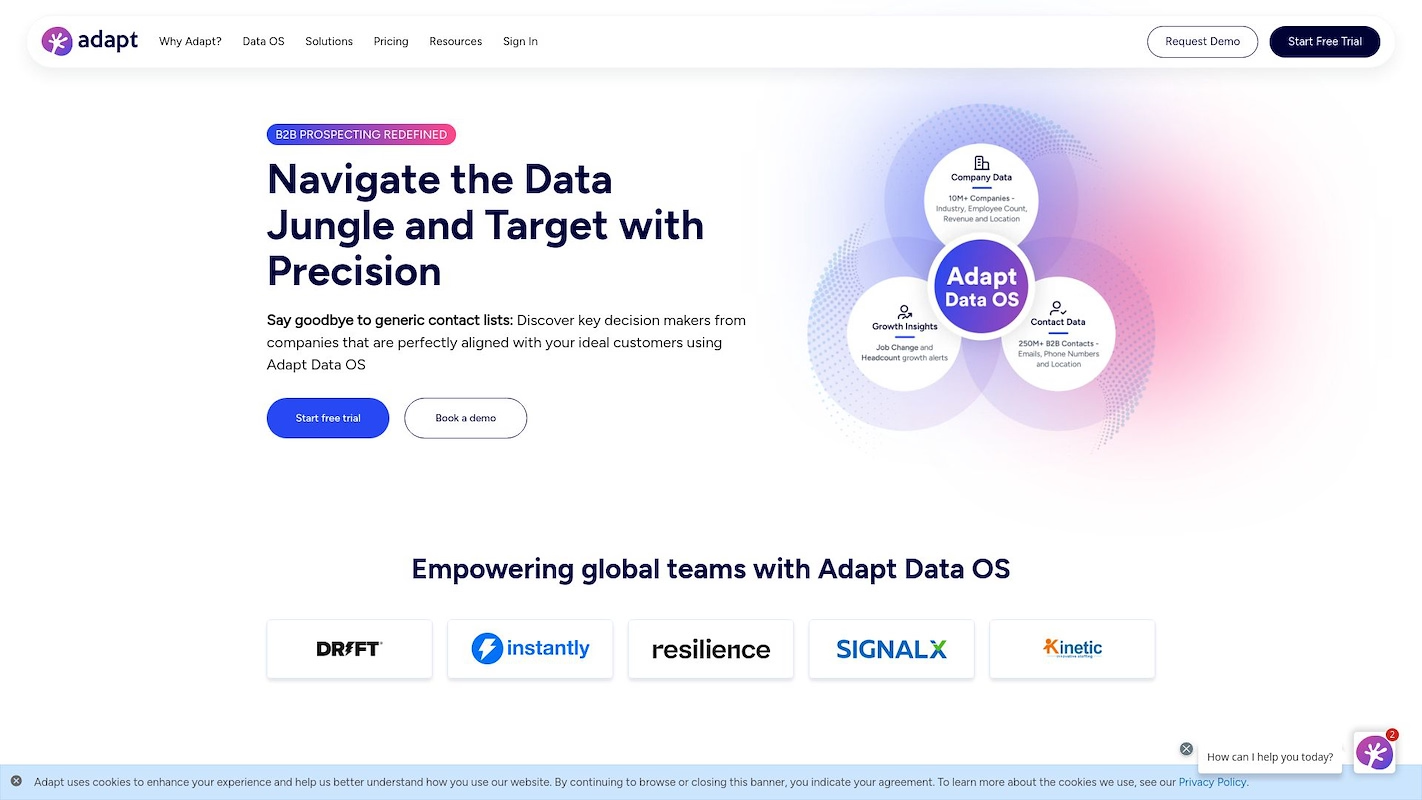
Adapt is a B2B intelligence platform with a database of company and contact information. Go-to-market teams use it for prospect discovery, to build targeted outreach lists, and to enrich their CRM data. The system provides contact details to support sales and marketing functions.
Adapt's Main Features
- Provides a database of over 150 million contacts and 30 million companies with advanced filters to build lead lists.
- Offers data enrichment to clean and update lead, contact, and account information within existing workflows.
- Includes dynamic lists that update in real time and a REST API to scale lead generation efforts.
- Integrates with CRM and marketing automation platforms to sync data directly into sales and marketing workflows.
How Adapt Compares to Rev
Average Review score: 4.6/5 stars based on 2,784 G2 reviews.
- Adapt provides a database of over 150 million contacts to find new prospects. This is different from Rev, which analyzes the data already inside a company’s CRM.
- It offers dynamic lists that automatically update with new prospect information. Rev, in contrast, focuses on analyzing the current state of deals already in the pipeline.
- The platform includes a REST API to help scale lead generation efforts. This data acquisition feature is not part of Rev's toolset, which is built for internal pipeline analysis.
- This tool enriches existing CRM records to keep contact information current. This is a data-sourcing function, whereas Rev uses the data as it is within the CRM for forecasting.
Potential Drawbacks Compared to Rev
- Adapt does not provide sales forecasting tools. This is a key difference for teams that use Rev to predict revenue from their current sales pipeline.
- The platform lacks features for in-depth deal inspection. Unlike Rev, it does not let managers analyze the health or progression of individual deals already in the sales cycle.
- It is not designed for core revenue operations workflows. This means it misses functions for forecast submissions or team-wide pipeline reviews, which are central to how Rev operates.
Cost and Budget Considerations
Adapt requires a custom quote, similar to Rev, and does not publish its pricing. User reviews note that it is a high-cost solution. For the most accurate pricing, it is best to visit Adapt's official website.
10) RocketReach
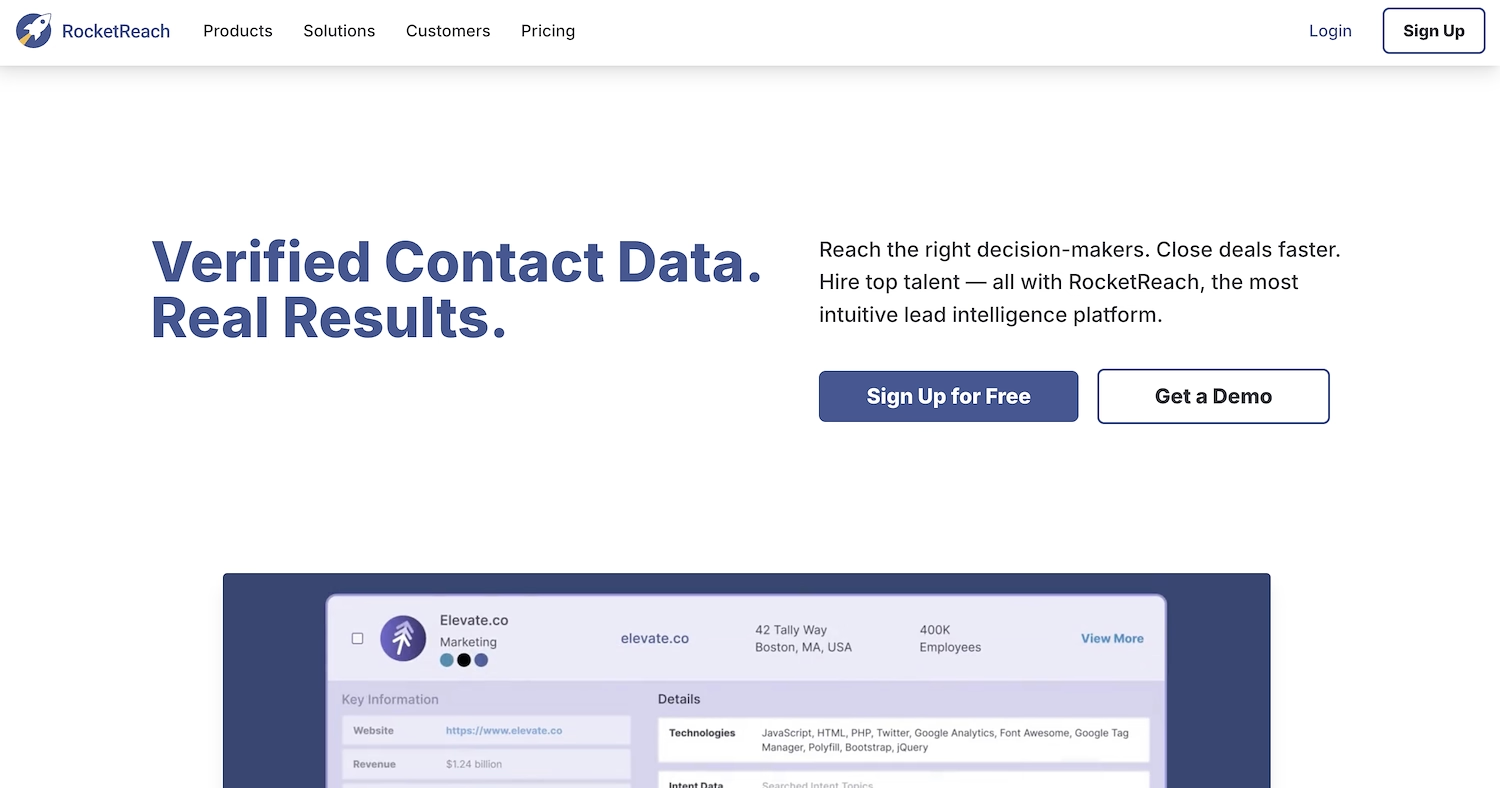
RocketReach is a sales intelligence platform that provides access to a database of contact and company information. Go-to-market teams use the tool for prospect discovery and to gather data for outreach campaigns. The system helps users find professional contact details to connect with potential leads.
RocketReach's Main Features
- Provides access to a database of over 700 million professionals and 35 million companies with verified contact details.
- Offers browser extensions for Chrome and Edge to find contact information from websites and social profiles.
- Includes an autopilot feature to create automated workflows for prospect discovery and engagement.
- Integrates with CRMs and sales tools like Salesforce and HubSpot through prebuilt connections and Zapier.
How RocketReach Compares to Rev
Average Review score: 4.4/5 stars based on 918 G2 reviews.
- RocketReach provides a database of over 700 million contacts to find new leads. This is different from Rev, which works with data already inside a company's CRM.
- It offers browser extensions to capture contact information directly from websites. Rev does not have a data capture function; it uses existing deal information for its analysis.
- The platform has public pricing, including a free plan. This approach differs from Rev's enterprise model, which requires a custom quote.
- Its autopilot feature automates prospect discovery to fill the top of the funnel. In contrast, Rev provides tools for mid-to-bottom-funnel deal analysis.
Potential Drawbacks Compared to Rev
- RocketReach does not offer sales forecasting tools. In contrast, Rev uses pipeline data to help leaders predict future revenue.
- The platform lacks features for in-depth deal inspection. This may be a drawback for managers who use Rev to analyze the health of individual opportunities.
- It is not built for core revenue operations workflows. For instance, the system does not include modules for forecast submissions, which are a standard feature in Rev.
Cost Comparison and Considerations
RocketReach offers public pricing with a free plan and paid tiers starting at $99 per month, making it accessible for teams needing predictable costs. In contrast, Rev requires a custom quote, a model typical for enterprise software. For full details, visit RocketReach 's official website.
Which One Should You Go With?
Choosing a Rev alternative depends on many variables, including your team's specific needs and budget. This guide analyzed several options to help you make an informed decision for your go-to-market strategy.
If you want to add automated capabilities to your sales function, 11x offers a different approach. Its autonomous agents handle tasks like prospect discovery and initial contact, supplementing your team's efforts without requiring a full system replacement.




